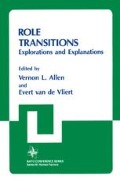Abstract
Occupational retirement looms as a social fact for many workers in industrialized countries. And with the continuing development of public and private pension programs and increased longevity and health, the number of retired workers is constantly growing. As an aggregate, the occupationally retired will be an important political and economic force, and they also will represent a pool of considerable talent and expertise. But retirement is not only a societal phenomenon; it also is a significant personal event in the lives of workers. Up to the time of retirement, the work role is a central role in the lives of many people. Not only is it a means for obtaining a variety of rewards and gratifications, but it also structures day-to-day behavior, provides status and social interaction, and generally shapes the nature of the worker’s life style as a whole. Given these considerations, the transition from the work role to the retirement role—whether in fact or in anticipation—is likely to instigate a period of adaptation on the part of the retiree. But exactly how people make the transition from work to retirement is, as yet, a poorly understood process.
Access this chapter
Tax calculation will be finalised at checkout
Purchases are for personal use only
Preview
Unable to display preview. Download preview PDF.
References
Atchley, R.C. Retirement and leisure participation: Continuity or crisis?The Gerontologist, 1971, 77, 13 – 17.
Atchley, R.C.The sociology of retirement. Cambridge, Mass.: Schenkman, 1976.
Backman, C.W. Toward an interdisciplinary social psychology: we’re closer when we think. In L. Berkowitz (Ed.), Advances in experimental social psychology. New York: Academic Press, in press.
Backman, C.W., & Secord, P.F. The self and role selection. In C. Gordon & K.J. Gergen (Eds.),The self in social interaction. New York: Wiley, 1968. Pp. 289 – 298.
Bell, B.D.Contemporary social gerontology. Springfield, 111.: Charles C. Thomas, 1976.
Burke, P. J., & Tully, J.C. The measurement of role identity.Social Forces, 1977,55, 881 – 897.
Cantor, N., Mischel, W.W., & Schwartz, J.C. A prototype analysis of psychological situations.Cognitive Psychology, 1982,14, 45 – 77.
Carp, F.M. Person-situation congruence in engagement.The Gerontologist, 1968,8, 184 – 188.
Friedlander, F. Underlying sources of job satisfaction.Journal of Applied Psychology, 1963,47, 246 – 250.
Friedmann, E.A., & Havighurst, R.J.The meaning of work and retirement. Chicago: University of Chicago Press, 1954.
George, L.K. The impact of personality and social status factors upon levels of activity and psychological well-being.Journal of Gerontology, 1978, 55, 840 – 847.
George, L.K., & Maddox, G.L. Subjective adaptation to loss of the work role.Journal of Gerontology, 1977, 52, 456 – 462.
Goffman, E.Stigma: Notes on the management of spoiled identity. Englewood Cliffs, N.J.: Prentice- Hall, 1963.
Hall D.T. A theoretical model of career subidentity development in organizational settings.Organizational Behavior and Human Performance, 1971,6, 50 – 76.
Herzberg, F., Mausner, B., & Snyderman, B.B.The motivation to work. New York: Wiley, 1959.
Hoe, B.H.Occupational satisfaction as a function of self-role congruency. Unpublished Master’s Thesis, University of Nevada, Reno, 1962.
Kasl, S.V. The impact of retirement. In C.L. Cooper & R. Payne (Eds.),Current concerns in occupational stress, New York: Wiley, 1980. Pp. 137 – 186.
Maddox, G.L. Fact and artifact: Evidence bearing on disengagement theory. In E. Palmore (Ed.),Normal aging. Durham, N.C.: Duke University Press, 1970. Pp. 318 – 328.
Maddox, G.L., & Douglass, E.B. Aging and individual differences: A longitudinal analysis of social, psychological, and physiological indicators.Journal of Gerontology, 1974,29, 555 – 563.
Mannheim, B. A comparative study of work centrality, job rewards and satisfaction.Sociology of Work and Occupations, 1975, 2, 79 – 102.
Markus, H. Self-schemata and processing information about the self.Journal of Personality and Social Psychology, 1977, 55, 63 – 78.
McCall, G.J., & Simmons, J.L.Identities and interactions. New York: Free Press, 1966.
Miller, S.J. The social dilemma of the aging leisure participant. In A.M. Rose & W.A. Peterson (Eds.),Older people and their social world. Philadelphia: F.A. Davis, 1965. Pp. 77 – 92.
Peppers, L.G. Patterns of leisure and adjustment to retirement.The Gerontologist, 1976,16, 441 – 446.
Sarbin, T.R., & Allen, V.L. Role theory. In G. Lindzey & E. Aronson (Eds.),The handbook of social psychology(Vol. 1 ). Reading, Mass.: Addison-Wesley, 1968. Pp. 488 – 567.
Schank, R., & Abelson, R.Scripts, plans, goals and understanding. Hillsdale, N.J.: Erlbaum, 1977.
Schlenker, B.R. Translating actions into attitudes: An identity-analytic approach to the explanation of attitudes. In L. Berkowitz (Ed.),Advances in experimental social psychology(Vol. 15 ). New York: Academic Press, 1982. Pp. 193 – 247.
Secord, P.R., & Backman, C.W.Social psychology. New York: McGraw-Hill, 1974.
Shanas, E. Adjustment to retirement: Substitution or accommodation? In F.M. Carp (Ed.),Retirement. New York: Behavioral Publications, 1972. Pp. 219 – 243.
Snyder, M.The self in action. Paper presented at the 62nd annual meeting of the Western Psychological Association, Sacramento, Calif., April, 1982.
Stryker, S. Identity salience and role performance: The relevance of symbolic interaction theory for family research.Journal of Marriage and the Family, 1968,30, 558 – 564.
Super, D.E. The structure of work values in relation to status, achievement, interests, and adjustment.Journal of Applied Psychology, 1962,46, 231 - 239.
Turner, R.H. The role and the person.American Journal of Sociology, 1978,84, 1 – 23.
Videbeck, R., & Knox, A.B. Alternative participatory responses to aging. In A.M. Rose & W.A. Peterson (Eds.),Older people and their social world, Philadelphia: F.A. Davis, 1965. Pp. 37 – 48.
Voydanoff, P. The relationship between perceived job characteristic and job satisfaction among occupational status groups.Sociology of Work and Occupations, 1978, 5, 179 – 192.
Author information
Authors and Affiliations
Editor information
Editors and Affiliations
Rights and permissions
Copyright information
© 1984 Plenum Press, New York
About this chapter
Cite this chapter
Kosloski, K., Ginsburg, G., Backman, C.W. (1984). Retirement as a Process of Active Role Transition. In: Allen, V.L., van de Vliert, E. (eds) Role Transitions. NATO Conference Series, vol 23. Springer, Boston, MA. https://doi.org/10.1007/978-1-4613-2697-7_23
Download citation
DOI: https://doi.org/10.1007/978-1-4613-2697-7_23
Publisher Name: Springer, Boston, MA
Print ISBN: 978-1-4612-9676-8
Online ISBN: 978-1-4613-2697-7
eBook Packages: Springer Book Archive

